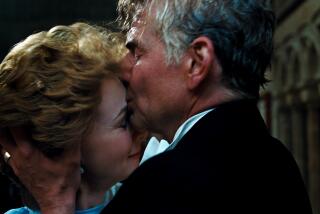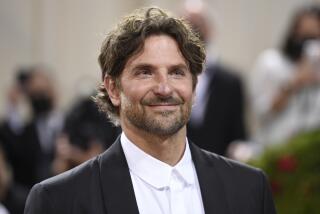Famous Names Guided His Career : Collector Turns Love for Artifacts of Eminent Into Vocation
It started with Charles Lindbergh. There were these 20 letters the pioneer aviator had penned a few years before his historic flight across the Atlantic, and Leon Becker just had to have them.
The year, however, was 1934, the depths of the Great Depression, and young Leon’s family was “so poor we didn’t know we were poor.” Just 15, he could ill afford the $80 asking price for the letters, which were owned by a friend whose father had been a barnstorming pilot and corresponded with Lindbergh.
But after much prodding, including a vain threat to leave home forever, Becker convinced his mother to take out a loan on her insurance policy to get the money. The Lindbergh letters were his.
For Becker, it was the start of a lifelong passion.
Soon Started Collecting
He soon began collecting the autographs and other written artifacts of the eminent, from Napoleon Bonaparte to the Beatles, George Washington to John Wayne. Today, Becker has pooled an enormous collection numbering upwards of 20,000 separate items, all of it housed in his La Costa business dubbed, appropriately enough, Memorabilia, Ltd.
Designed to look like a quaint English library, the shop is crammed full of letters, documents and autographed slips of paper, all of them nattily framed behind tightly sealed panes of glass. Nestled beside each document is a photograph. World leaders, Hollywood stars, famous writers, prestigious musicians, all gaze down from the walls of the place Leon built.
“I still get a thrill that they touched this paper,” said Becker, a stout 69-year-old. “There is an intimacy attached to it. To have something that world-renowned people touched in your possession. . .well, it has always intrigued me.”
Becker decided to make his avocation his vocation 15 years ago, establishing Memorabilia, Ltd. after a prosperous career as an investment banker in Beverly Hills. Housed in a shopping center a few strides south of the La Costa hotel and spa, the business typically draws only about a dozen patrons on a good day, Becker said. Many are visitors to the nearby spa and most are rich.
Hobby for the Rich
Indeed, this is a hobby for the wealthy. Even Becker’s paltriest pieces--something as contemporary as an autographed photo of Hollywood hunk Mark Harmon--can fetch several hundred dollars. Price tags on more historically significant items run far higher. For instance, one of perhaps two dozen original signed copies of former President Richard Nixon’s resignation letter costs $15,000.
“This is my special world, a world full of the wonders of yesterday,” Becker said. “In this world of mine, everything is uniquely individual. There never are two exactly alike.”
In one corner are framed displays of the artifacts of the authors--a letter from Oscar Wilde, a note by Robert Frost, the autographs of John Steinbeck and Thomas Mann. Tucked away in another cozy nook are the framed photos and autographs of movie greats such as Clark Gable, Charlie Chaplin, Fred Astaire and Mae West (who, ever saucy, signed her busty likeness, “Sin-cerely, Mae West”).
Elsewhere is the presidential corner. There is a short message from Abraham Lincoln, a letter from Harry S. Truman. Resting nearby are letters signed by Gandhi, Hindenburg, Golda Meir and other world leaders. Along another row are the aviators: a note from Amelia Earhart, Orville Wright’s signature over an etching of the Kitty Hawk flight, an autograph from Neil Armstrong, first man on the moon.
Display Seems Endless
The documents, the letters, the signatures seem endless, almost overwhelming. Yet it is Becker who is the star of this show.
Gray-haired and gregarious, he leads visitors on a tour of his “little museum” with the zeal of a carnival barker and the aplomb of a college professor. One after another, each display draws forth a new story, a thumbnail sketch of history sparked by the sight of a scratchy autograph from yesteryear.
Eying the autographed photo of Baron Manfred von Richthoven, the Red Baron of World War I, Becker offers how the $12,500 piece is one of “only five or six known to exist in the world.”
“He died at 26,” Becker continues. “He was shot down after he had 80 kills.”
Admiral Nelson Letter
Becker leaps to a letter penned by British Admiral Horatio Nelson, quickly pointing out that the noted seaman had the audacity to use his own silhouette as the watermark on his stationery.
“I think that’s a marvelous sense of self-esteem,” Becker says with a wink.
This is a man enjoying life. He greets an attractive female patron by unabashedly asking, “Dear, tell me, how was heaven when you left it?” At another juncture, Becker flips on a top hat and cape, wheeling about dramatically to demonstrate his attire while attending the opera.
Perhaps most amusing of all are the stories Becker tells of his own encounters with the famous.
Lunched With Einstein
As valedictorian of his college class at an engineering school in New York, Becker earned the honor of spending several hours at a luncheon with the graduation speaker, Albert Einstein. A few days later, Becker’s father encouraged Leon to write a letter to the renowned physicist expressing his thanks.
When the best the young man could produce was a terse note, Becker’s father wrote an intricate, four-page letter, had Leon copy it and send it to the physicist.
Thinking the young man had authored the letter, Einstein was impressed enough to invite Becker to spend several weeks that summer with his family. While Becker admits he was “too young at the time to realize the enormity” of living with the pre-eminent genius of the age, the experience fueled his thirst for memorabilia.
His next brush with the famous came a decade later. While at a museum in New York, Becker heard a voice well known to people of the day--Eleanor Roosevelt. Turning around, he inadvertently bumped the former First Lady with his umbrella.
Invited to Tea
Becker recalls how he overflowed with apologies. “Oh, Mrs. Roosevelt, I love you and I hurt you!” he chirped. Amused by the young man’s overwhelming despair, the former First Lady invited Becker to tea. He accepted and offered to pay, but Mrs. Roosevelt chose a high-priced restaurant--and Becker had all of $2 on him.
“I was aghast,” Becker recalls. “The humiliation of not being able to pay the check for the First Lady! Luckily, the owner of the restaurant wouldn’t even think of giving us a bill.”
These days, Becker is continuously attending auctions held by the big trading houses or communicating with other collectors, adding to his huge reservoir of memorabilia. Once he purchases a document, Becker takes care to select just the right photograph to go along with it, then carefully mounts and frames the piece.
“They become art,” he said. “To me, this is infinitely better than a coin collection or stamp collection that is relegated to a vault because of its value.”
Checks Authenticity
He meticulously checks each item for authenticity, judging the paper, the ink, the signature. Nonetheless, counterfeiting is not a common practice in the field.
“There’s too much trouble for the thief to engage in that enterprise,” Becker explained. “It would take too much skill, too much scholarship to achieve the high degree of detail needed. One would be far better off making $20 bills.”
Despite his love affair with memorabilia, Becker has had to distance himself to a degree since becoming a dealer. “Once you become a dealer, you can no longer be a collector,” Becker said. “In no way can you distinguish between what you would like to keep and what you would sell.”
Although invariably on a first-name basis with customers, Becker has occasionally had troubles. Several years ago, he sold more than $100,000 in documents to J. David Dominelli, erstwhile kingpin of the once high-flying J. David & Co. But instead of paying cash for the documents, Dominelli opened a foreign currency trading account in Becker’s name.
Left High and Dry
When the financier’s empire collapsed, Becker, like numerous other investors, was left high and dry. Today, Becker expresses hope only that he may one day retrieve half the documents’ worth from the bankruptcy trustee overseeing the case.
“It hurt,” Becker recalls. “It was a big wound. J. David used to sit here for hours at a time. He’d point to this or that and say, ‘I want it. I want it.’ I thought I was looking at genius.”
But such experiences are few and far between, small detours on an otherwise pleasant journey that invariably keeps a smile plastered on Becker’s face.
“I’ve made a wonderful living, a handsome living, and it’s been a wonderful time,” Becker says. “Coming to work is coming to my playground.”
More to Read
Sign up for The Wild
We’ll help you find the best places to hike, bike and run, as well as the perfect silent spots for meditation and yoga.
You may occasionally receive promotional content from the Los Angeles Times.






